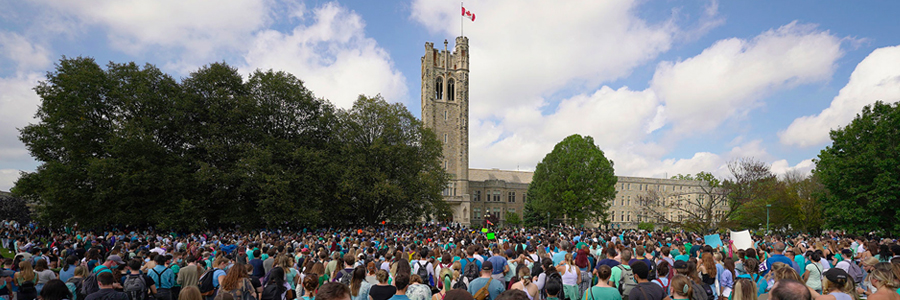Gender-Based & Sexual Violence Action Committee

Background on the Action Committee:
In response to heightened concerns about student safety and sexual violence on campus, the Action Committee on Gender-Based & Sexual Violence was created in October 2021 to study the issue and make recommendations for changing the culture at Western.
The Committee was identified as one element in a broader action plan implemented to enhance student safety following incidents of sexual violence arising during OWeek 2021.
Co-chaired by Dr. Terry McQuaid and Prof. Nadine Wathen, the Committee began meeting semi-monthly on November 2, 2021, and will deliver a report of its findings and recommendations in spring of 2022.
See TERMS OF REFERENCE for more details on the Committee's mandate.
See ACGBSV MEMBERSHIP for short bios on each of the Committee's 12 members.
See MEETING OUTCOMES for the latest update on the Committee's work.
Update: February 7, 2022
ACGBSV submits interim recommendations
On February 2, 2022, the Action Committee submitted four recommendations (see below) to Acting President Sarah Prichard.
These recommendations were submitted as interim suggestions for action, pending submission of the Committee’s final report in late March/early April.
In its final report, the Committee will provide accompanying strategies for ongoing evaluation and quality improvement processes and indicators for each proposed recommendation, including those listed below.
Interim Recommendation 1:
Prepare students and parents/caregivers for transition to campus
Students and their parents/caregivers must be made be aware of Western’s values and stance on gender-based and sexual violence (GBSV) and safety before arriving on campus. They must also be offered opportunities to understand and engage with Western’s values once they arrive.
We recommend that content be added to admission letters indicating expectations for students, and articulating Western’s values related to GBSV and creating a safe and inclusive campus, specifically:
- Require completion of GBSV education modules by new students before they arrive on campus, and make this mandatory for all incoming students, including those in Residence and all who participate in Orientation Week activities.
- Develop a structure to continue offering first-year students in Residence mandatory in-person, facilitated skill-building sessions as a follow-up to the online learning (as conducted in 2021-22), and make this available to allincoming first-year students.
- Commit to providing free menstrual products in all campus washrooms, and include a statement to this effect in admission materials to demonstrate that the University has an inclusive stance on those who menstruate (i.e., this is positioned as a specific indicator of the value of gender inclusivity).
- Add content directed to parent/caregivers related to GBSV and social inclusion, and link this content to Student Experience’s “Community Connections” program.
Interim Recommendation 2:
A collaborative and coordinated process for hiring and training Sophs and others providing guidance/peer mentorship to new students
Sophs play a vital role in the transition and orientation of first-year students to campus life at Western. A significant concern raised by many community members during the Fall student transition to campus has been ensuring that Sophs and other student mentors are well-trained and appropriately supported in their roles, both to ensure safety and well-being of new students, and the Sophs/mentors themselves.
We recommend that new training modules be developed based on existing disclosure support training currently being rolled out, but tailored for Sophs and student mentors. These would have online and facilitated in-person skill-building components, ensuring that Sophs/student mentors understand GBSV, EDI, and other aspects of student safety and well-being, specifically:
- This training would be developed in collaboration and consultation with the University Students’ Council (USC).
- The Society of Graduate Students (SOGS) and other relevant community members would be consulted on aspects of training involving graduate students and, potentially, other groups of student mentors.
- The Centre for Education & Research on Violence Against Women & Children (CREVAWC) and other partners would be consulted for content, evaluation strategies, etc.
We also recommend that Western’s GBSV prevention and response staff and the GBSV support coordinator be included on Soph/student leader recruitment, hiring, and training committee(s). This will create an ongoing mechanism to ensure that this coordinated and collaborative response for campus safety is sustained.
Interim Recommendation 3:
Enhance Housing support staff in Residences from start of term
There is a need for after-hours professional support in Residences that, at times, is beyond the capacity of a peer-led workforce. In mid-Fall 2021, Western Housing added staff positions (currently called “Health & Safety Advisors”) in Residences to “engage with students, provide educational conversations, address and document behaviour, and escalate concerns as necessary”. These staff provide increased supports to all students in Residence to enhance safety and well-being.
We recommend that this program be reviewed at the end of the Winter 2022 semester, including fulsome student feedback, to assess whether the program has met its stated goals.
Based on this review, we also recommend that a comprehensive staffing model be refined/developed to ensure adequate resources are in place to support the 24/7 demands of on-campus Residences, from the start of the Fall 2022 semester forward.
Interim Recommendation 4:
Add additional GBSV staff to Student Experience
Western is significantly under-resourced, compared to comparator universities, regarding the number/proportion of staff responding to GBSV disclosures and providing prevention and response training. Having sufficient staffing in these roles is critical to tackling GBSV on campus. Resources are also a key support for students coming to campus with historical experiences of childhood violence, including sexual violence; these emerging adults require support to address GBSV and reduce these behaviours, and their impacts, at the individual level. We also know that encouraging people to seek support will result in increased disclosures. Western needs to be prepared to respond.
To bring Western in line with other institutions—and to support the increased training needs outlined above, as well as the anticipated increase in disclosures during the transition-to-campus period and beyond—we recommend that Western Student Experience hire at a minimum:
- One (1) additional GBSV support case manager;
- One (1) additional GBSV prevention and education coordinator.
